De Amerikaanse schrijver David Benioff (pseudoniem van David Friedman) werd geboren in New York City op 25 september 1970. Zie ook alle tags voor David Benioff op dit blog.
Uit: The 25th Hour
“They found the black dog sleeping on the shoulder of the West Side Highway, dreaming dog dreams. A crippled castoff, left ear chewed to mince, hide scored with dozens of cigarette burns-a fighting dog abandoned to the mercy of river rats. Traffic rumbled past: vans with padlocked rear doors, white limousines with tinted glass and New Jersey plates, yellow cabs, blue police cruisers.
Monty parked his Corvette on the shoulder and shut off the engine. He stepped from the car and walked over to the dog, followed by Kostya Novotny, who shook his head impatiently. Kostya was a big man. His thick white hands hung from the sleeves of his overcoat. His face had begun to blur with fat; his broad cheeks were red from the cold. He was thirty-five and looked older; Monty was twenty-three and looked younger.
“See?” said Monty. “He’s alive.”
“This dog, how do you call it?”
“Pit bull. Must have lost somebody some money.”
“Ah, pit bull. In Ukraine my stepfather has such dog. Very bad dog, very bad. You have seen dogfights at Uncle Blue’s?”
“No.”
Flies crawled across the dog’s fur, drawn by the scent of blood and shit. “What do we do, Monty, we watch him rot?”
“I was thinking of shooting him.”
Awake now, the dog stared impassively into the distance, his face lit by passing headlights. The pavement by his paws was littered with broken glass, scraps of twisted metal, black rubber from blown tires. A concrete barricade behind the dog, separating north- and southbound traffic, bore the tag SANE SMITH in spray-painted letters three feet high.
“Shooting him? Are you sick in the head?”
“They just left him here to die,” said Monty. “They threw him out the window and kept driving.”
“Come, my friend, it is cold.” A ship’s horn sounded from the Hudson. “Come, people wait for us.”
“They’re used to waiting,” said Monty. He squatted down beside the dog, inspecting the battered body, trying to determine if the left hip was broken. Monty was pale-skinned in the flickering light, his black hair combed straight back from a pronounced widow’s peak. A small silver crucifix hung from a silver chain around his neck; silver rings adorned the fingers of his right hand.”
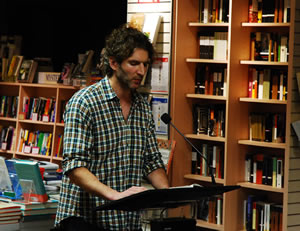
David Benioff (New York, 25 september 1970)
De Spaanse schrijver Carlos Ruiz Zafón werd geboren op 25 september 1964 in Barcelona. Zie ook mijn blog van 25 september 2010 en eveneens alle tags voor Carlos Ruiz Zafón op dit blog.
Uit: The Angel’s Game (Vertaald door Lucia Graves)
“The deputy editor looked at me askance. I entered the office, which smelled of sweat and tobacco in that order. Ignoring my presence, Don Basilio continued to read through one of the articles lying on his table, a red pencil in hand. For a couple of minutes, he machine- gunned the text with corrections and amputations, muttering sharp comments as if I weren’t there. Not knowing what to do, and noticing a chair placed against the wall, I slid toward it.
“Who said you could sit down?” muttered Don Basilio without raising his eyes from the text.
I quickly stood up and held my breath. The deputy editor sighed, let his red pencil fall, and leaned back in his armchair, eyeing me as if I were some useless piece of junk.
“I’ve been told that you write, Martin.”
I gulped. When I opened my mouth only a ridiculous, reedy voice emerged.
“A little, well, I don’t know, I mean, yes, I do write…”
“I hope you write better than you speak. And what do you write– if that’s not too much to ask?”
“Crime stories. I mean…”
“I get the idea.”
The look Don Basilio gave me was priceless. If I’d said I devoted my time to sculpting figures for Nativity scenes out of fresh dung I would have drawn three times as much enthusiasm from him. He sighed again and shrugged his shoulders.
“Vidal says you’re not altogether bad. He says you stand out.”
“Of course, with the sort of competition in this neck of the woods, one doesn’t have to run very fast. Still, if Vidal says so.”
Pedro Vidal was the star writer at The Voice of Industry. He penned a weekly column on crime and lurid events–the only thing worth reading in the whole paper. He was also the author of a dozen modestly successful thrillers about gangsters in the Raval quarter carrying out bedroom intrigues with ladies of high society.”
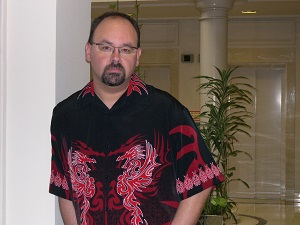
Carlos Ruiz Zafón (Barcelona, 25 september 1964)
De Poolse schrijver en letterkundige Andrzej Stasiuk werd geboren op 25 september 1960 in Warschau. Zie ook mijn blog van 25 september 2010 en eveneens alle tags voor Andrzei Stasiuk op dit blog.
Uit: Tales Of Galicia (Vertaald door Margarita Nafpaktitis)
“When there was a shortage of calves and pigs in the village, or when people’s hunger was already satisfied, or when a Lenten calm descended between weddings and christenings, he harnessed two horses to his ashwood cart and headed south. His woman stayed at home. It was no big deal to beat a path a couple times a day between the house, the pigsty and the cow barn, that’s what he thought. That much one woman could handle. He started the journey in the morning and he could have made it by afternoon, but there was a pub halfway there. No matter where you’re headed, some pub or other is always standing by the side of the road, like a reward for the peace and quiet at home.
He tied up the horses, tossed them a couple handfuls of hay and sat down to drink. And since everybody knew him, he always managed to find himself an enemy. Come evening, the soberer ones heaved two grappling men out the door. They landed in the mud or the dust, trying to get at vulnerable places, each trying to force the other to feel some pain. Then Kosciejny continued on his journey south. Peaceful, drowsing, just like the horses, one foot after the other to the edge of night, where darkness flowed over the mountains like rich, black milk. He unharnessed the horses in his sleep, and in his sleep he fell on a bed where he lay on his back until morning. The men living in that barrack at the end of the world said that Kosciejny slept with his eyes open, that he must have been afraid of something. But they were the ones who were afraid, and they closed their eyes so they didn’t have to look out at the dark. They got up in the morning and left for the clearing. Kosciejny stayed behind and drank whatever he had brought with him. Rain was falling beyond the window. The room was cluttered with the debris of objects essential for living. Empty cans, dry bread crusts, leaky rubber boots, empty bottles … dirt and freedom always intermingle. Kosciejny talked to himself and sang songs that nobody ever heard. He slumped on the bed, and the men returning at dusk ran up against his motionless gaze, which took in everyone and no one.”
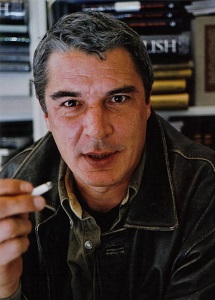
Andrzej Stasiuk (Warschau, 25 september 1960)
De Amerikaanse schrijver William Faulkner werd geboren op 25 september 1897 in New Albany, Mississippi. Zie ook mijn blog van 25 september 2010 en eveneens alle tags voor William Faulkner op dit blog.
Uit: The Sound And The Fury
“Caddy uncaught me and we crawled through. Uncle Maury said to not let anybody see us, so we better stoop over, Caddy said. Stoop over, Benjy. Like this, see. We stooped over and crossed the garden, where the flowers rasped and rattled against us. The ground was hard. We climbed the fence, where the pigs were grunting and snuffing. I expect they’re sorry because one of them got killed today, Caddy said. The ground was hard, churned and knotted. Keep your hands in your pockets, Caddy said. Or they’ll get froze. You dont want your hands froze on Christmas, do you.
“It’s too cold out there.” Versh said. “You dont want to go outdoors.”
“What is it now.” Mother said.
“He want to go out doors.” Versh said.
“Let him go.” Uncle Maury said.
“It’s too cold.” Mother said. “He’d better stay in. Benjamin. Stop that, now.”
“It wont hurt him.” Uncle Maury said.
“You, Benjamin.” Mother said. “If vou dont be good, you’ll have to go to the kitchen.”
“Mammy say keep him out the kitchen today.” Versh said. “She say she got all that cooking to get done.”
“Let him go, Caroline.” Uncle Maury said. “You’ll worry yourself sick over him.”
“I know it.” Mother said. “It’s a judgment on me. I sometimes wonder.”
“I know, I know.” Uncle Maury said. “You must keep your strength up. I’ll make you a toddy.”
“It just upsets me that much more.” Mother said. “Dont you know it does.”
“You’ll feel better. ” Uncle Maury said. “Wrap him up good, boy, and take him out for a while.”
Uncle Maury went away. Versh went away.
“Please hush.” Mother said. “We’re trying to get you out as fast as we can. I dont want you to get sick.”
Versh put my overshoes and overcoat on and we took my cap and went out. Uncle Maury was putting the bottle away in the sideboard in the diningroom.
“Keep him out about half an hour, boy.” Uncle Maury said. “Keep him in the yard, now.”
“Yes, sir.” Versh said. “We dont never let him get off the place.”
We went out doors. The sun was cold and bright. “
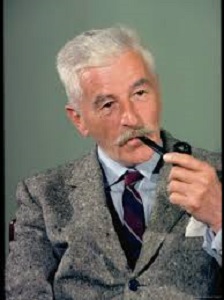
William Faulkner (25 september 1897 – 6 juli 1962)
De Belgische dichteres en schrijfster Patricia Lasoen werd geboren op 25 september 1948 in Brugge. Zie ook mijn blog van 25 september 2010 en eveneens alle tags voor Patricia Lasoen op dit blog.
Landschap met roze hoed
“Niets kan zachter golven
dan een golfterrein”
denkt de dame met de grote hoed
en de suède handschoenen.
De heer die haar galant terzijde
staat, kijkt heel even
naar haar borsten in de roze crêpe jurk
en slaat dan met een forse slag
het kleine witte balletje
een heel eind verder.
Onder de pompelmoezen maan
Onder de pompelmoezen maan
Op de oude schommel
Als op een droom van vroeger
Scharnieren knarsen
Krekels zwijgen
Onkruid
Schiet uit het droge zand omhoog
Zaden zijn verdord van de hitte
Lelies bloeien niet verder
Algen vertroebelen de vijver
Je bent er niet
Er is brood en wijn
Je bent er niet
Pompelmoezen maan
Fruit en wijn
Dompelpomp
Soezende deken
Slaap
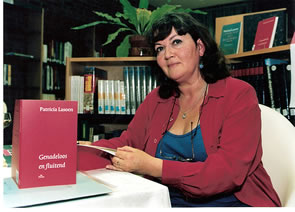
Patricia Lasoen (Brugge, 25 september 1948)
Zie voor nog meer schrijvers van de 25e september ook mijn blog van 25 september 2012 en eveneens mijn blog van 25 september 2011 deel 2 en eveneens deel 3.
